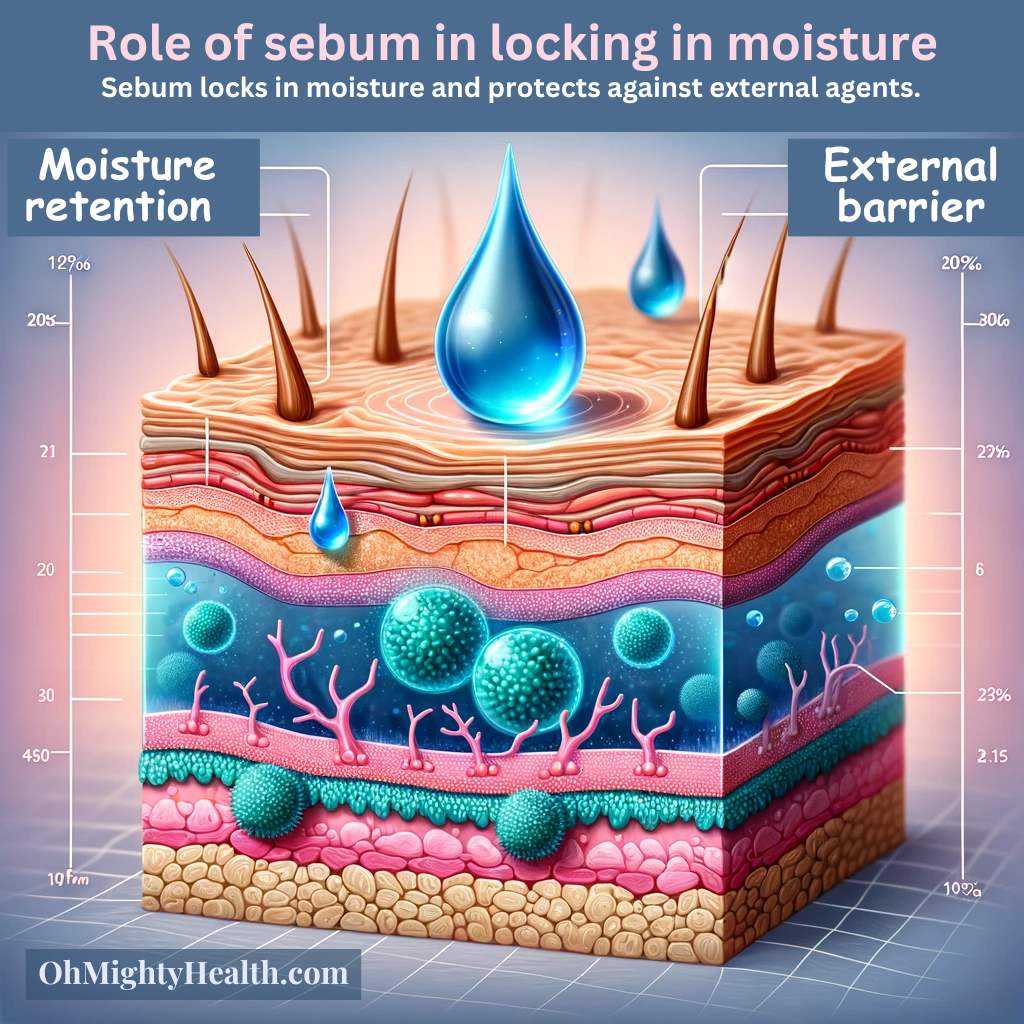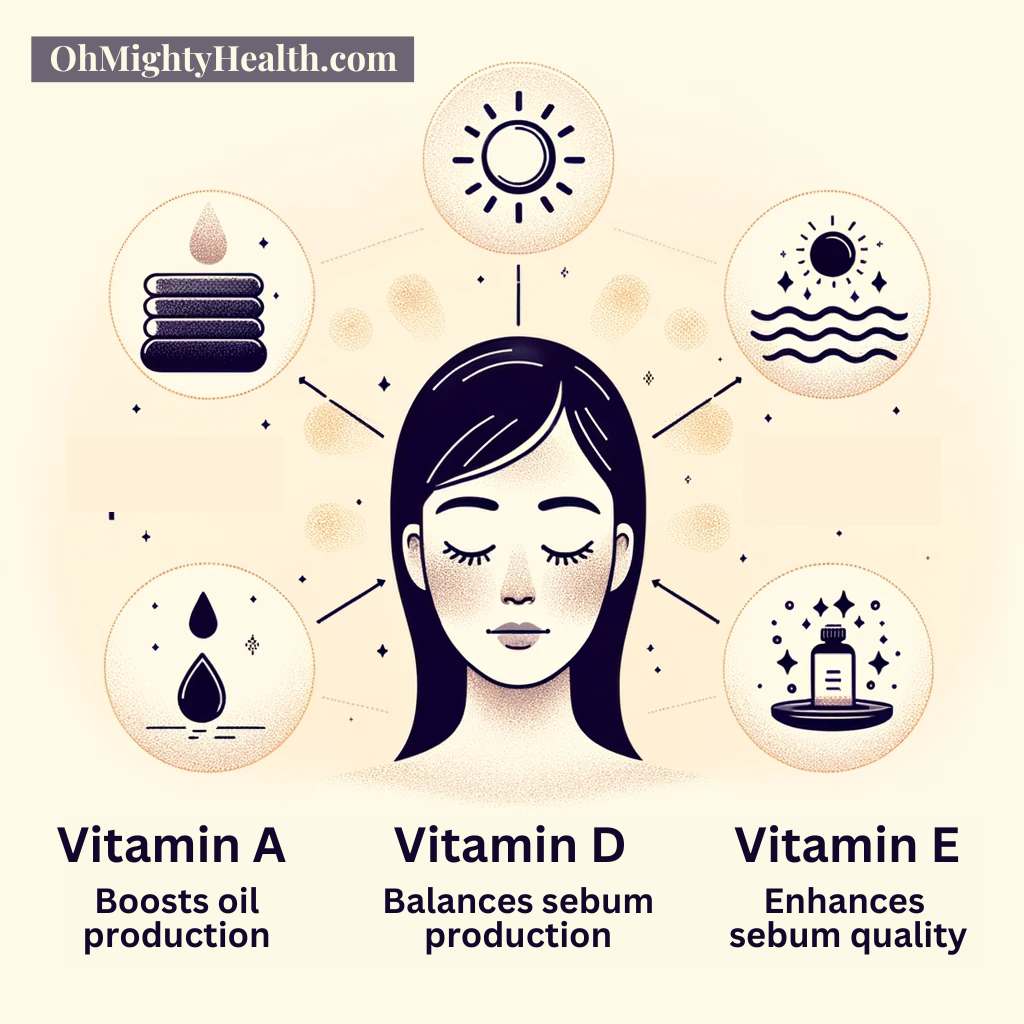Vitamins that Increase Sebum Production: A, D & E
Do you ever wish you could boost your skin’s natural oil production?
The oil in our skin is called “sebum”, a substance produced by the sebaceous glands. When produced in the right amount, sebum locks in moisture and protects against irritants.
Certain key vitamins can help stimulate sebum production to achieve balanced, hydrated skin. Balanced sebum also gives a healthy glow. Some vitamins may help the production of sebaceous glands.
Let’s look at how Vitamins A, D, and E can naturally boost sebum to achieve the perfect balance of skin oil and hydration.
What is Sebum and Why Your Skin Loves It
Sebum is your skin’s natural moisturiser and protector.
Produced by tiny sebaceous glands, this oily substance is your body’s way of keeping your skin hydrated, supple, and safe from harsh elements. Think of it as your skin’s built-in defence system.
Why does your skin adore sebum? It’s simple. Sebum helps to create a protective barrier. This barrier locks in moisture, ensuring your skin stays hydrated and doesn’t dry out. Plus, it guards against external nasties like pollution and bacteria.

But sebum isn’t just about protection. It also plays a key role in keeping your skin looking and feeling smooth. When balanced right, sebum contributes to that soft, healthy glow we all strive for.
Too little of it, and your skin can become dry and flaky. Too much, and you might find yourself battling oiliness or acne. Striking the perfect balance is key for healthy, happy skin.
The role of sebum:
- It forms a barrier on your skin’s surface to lock in hydration and prevent water loss, keeping skin supple.
- The sebum barrier also shields skin from external irritants like pollution and bacteria.
- Sebum helps skin look and feel smooth with a soft, healthy glow.
- If your skin doesn’t produce enough sebum, it may become excessively dry and flaky.
- But if it makes too much sebum, that can contribute to oiliness, clogged pores and acne breakouts.
The key is maintaining a proper balance – where sebum production is sufficient to protect skin and retain moisture but not overactive, leading to greasiness or congestion. The right sebum equilibrium leaves skin looking vibrant and happy.
How Nutrients Like Vitamins Can Stimulate Sebum Production
Vitamins don’t just keep your body healthy; they also have a direct impact on your skin’s oil levels.
For example, some vitamins can tell your sebaceous glands to make more sebum. This is great news if your skin tends to be on the drier side.
These vitamins also ensure that the sebum your skin produces is rich and nourishing, just what your skin craves. This means better hydration and protection for your skin.
Incorporating these vitamins into your diet and topical skincare can be a simple yet effective way to help your skin’s sebum balance.
The Vitamin Trio that May Rev Up Sebum Production
Exploring vitamins for skin health can be like finding treasures.
Three vitamins stand out – A, D, and E. They play an important role in managing your skin’s sebum production.
Let’s see how each contributes to your skin’s natural oil balance, keeping it hydrated, healthy, and glowing.

1. Vitamin A: Boosting Your Skin’s Oil Output
Vitamin A is known for its ability to BOOST SKIN’S OIL PRODUCTION, which is especially beneficial if dealing with dry skin.
This vitamin works by stimulating the sebaceous glands, encouraging them to produce more sebum. More sebum means more natural moisturisation and protection for your skin.
2. Vitamin D: Balancing Your Skin’s Oil Production
Vitamin D is often referred to as the ‘sunshine vitamin. It plays a crucial role in BALANCING SKIN’S OIL PRODUCTION by regulating sebaceous glands.
This keeps the skin’s oil at just the right level, not too dry and not too oily. When low on Vitamin D, your skin might produce less sebum, leading to dryness.
Maintaining adequate Vitamin D levels can help regulate sebum production more effectively.
3. Vitamin E: Enhancing Your Skin’s Oil Quality
Vitamin E is a powerful antioxidant that supports healthy skin cell function and CONTRIBUTES TO WELL- MOISTURISED SKIN.
Regular Vitamin E intake can lead to increased quality of sebum produced, enhancing skin’s natural glow.
Together, these three vitamins can help manage the skin’s sebum levels. Incorporating them into your diet and skincare routine may help your skin stay radiant!
Key Benefits of Well-Oiled Skin
When your skin’s sebum levels are balanced, it benefits skin health. Let’s look at the key benefits.
- Fighting Dryness
Sebum naturally moisturises your skin, preventing dryness and flakiness by locking in moisture for a plump, healthy look. - Preventing Acne
Sebum helps in acne prevention by keeping skin smooth and preventing pore blockages from dead skin cells, leading to clearer skin. - Stronger Skin Barrier
Sebum moisturises and strengthens your skin’s defence against pollution and harsh weather, resulting in less irritation and healthier skin. - Youthful Skin
Sebum keeps your skin young and elastic by hydrating it and reducing the appearance of lines. - Fighting Germs
Sebum’s natural germ-fighting properties help shield your skin from bacteria, keeping it healthy.
Potential Pitfalls of Too Much Sebum
Too much sebum can bring its own issues. Here’s what to watch out for and how to handle it.
- Controlling Oiliness
Excess sebum can lead to greasy skin and spots; using gentle cleansers, exfoliating, and oil-free products can help control it. - Dealing with Acne
Too much sebum can cause acne by clogging pores; regular cleaning and using non-clogging products are essential, and a dermatologist can help if needed. - Skin Irritation
Too much sebum can irritate your skin, making it red or itchy. Choose skincare products that calm and soothe your skin. - Uneven Skin Tone
Excess oil can sometimes cause dark spots or an uneven skin tone. Using products that gently exfoliate and even out skin tone can be beneficial.
Managing Oiliness
Too much sebum can make your skin look greasy and shiny. This can lead to clogged pores. To keep this under control:
- Use gentle cleansers to remove excess oil without stripping your skin.
- Regularly exfoliate to clear away oil and dead skin cells.
- Choose oil-free moisturisers to hydrate without adding more oil.
- Products with salicylic acid are great for balancing sebum and keeping pores clear.
A skincare routine tailored for oily skin can help manage excess sebum, giving you a clearer, healthier complexion.
Finding the Right Sebum Balance with Vitamins A, D, and E
While sebum is important for skin health, it’s all about balance.
Getting your skin’s sebum level just right can be tricky, but it’s definitely doable with the right approach.
Here’s a simple way to incorporate and use Vitamins A, D, and E to your skincare routine:
- Choose What You Need: You don’t have to use all three vitamins in every product. Try a Vitamin A serum, a Vitamin E moisturiser, and maybe a sunscreen with Vitamin D. This way, your skin gets the right benefit from each vitamin without too much.
- Start Slow: If you’re new to these vitamins in skincare, begin with one and see how your skin takes it. If it’s all good, you can then slowly add the others.
- Watch Your Skin: Pay attention to how your skin reacts. If it gets irritated or feels uncomfortable, you might need to change your products or how you use them.
- Get Expert Advice: It’s always a good idea to talk to a skincare expert or dermatologist. They can recommend the best products and the right amount for your skin type.
Remember, everyone’s skin is different. What helps one person might not be right for you. The most important thing is to find what keeps your skin happy and glowing.
The Role of Sebum in Skin Health
We’ve learned quite a bit about sebum, your skin’s own oil. Vitamins A, D, and E can really give your sebum a boost, and having just the right amount is key.
Sebum is brilliant for keeping your skin moist, protecting it from nasty stuff in the air, and keeping it clear and bright.
But remember, balance is important. Too much sebum can make your skin oily and cause spots. Too little, and your skin might get dry and uncomfortable.
How do you find that perfect balance? It’s about using the right vitamins in your skincare, choosing products that are good for your skin type, and maybe even getting some advice from a dermatologist.
Knowing what your skin needs and looking after it well is the way to balance your sebum.
With a little bit of knowledge and care, sebum can be amazing for your skin, helping it stay healthy and radiant.
When managed well, it’s a real asset to your skin’s health and appearance.
We’d Love Your Feedback!
Did you find our guide on sebum and skin health helpful? We hope it answered your questions and helped you understand your skin better.
Please share your thoughts with us. Your feedback is crucial in helping us improve and provide the information you’re looking for.
Got more questions or any suggestions? Drop them in the comments below. We really value what you have to say!
Every comment you make helps us create content that’s more in tune with your needs.
So, please don’t hold back – let us know what you think!

